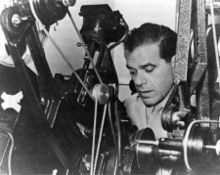Frank Capra
Italian-born American film director (1897–1991)
Frank Russell Capra (born Francesco Rosario Capra; May 18, 1897 – September 3, 1991) was a Sicilian American film director, producer and writer who became the creative force behind some of the major award-winning films of the 1930s and 1940s. Born in Italy and raised in Los Angeles from the age of five, his rags-to-riches story has led film historians such as Ian Freer to consider him the "American dream personified."

Quotes
edit- I made mistakes in drama. I thought drama was when actors cried. But drama is when the audience cries.
- 1001 quotations to inspire you before you die, Quintessence Editions Ltd., 2016, ISBN 978-1-84403-895-4
Quotes about Capra
edit- Shortly after the United States entered World War Two, Army Chief of Staff George C. Marshall summoned Frank Capra, the Hollywood director, and asked him to prepare a series of orientation films for viewing by American troops. When Capra demurred on the grounds that he had never made a documentary before, Marshall retorted: "Capra, I have never been Chief of Staff before. Thousands of young Americans have never had their legs shot off before. Boys are commanding ships today, who a year ago had never seen the ocean before." The director apologized, and promised "The best damned documentary films ever made."
- John W. Dower, War Without Mercy: Race & Power in the Pacific War (1986), p. 15
- The films subsequently produced for the Army by Capra and his team survive as classics of wartime cinematic propaganda- a remarkable accomplishment, in retrospect, since each script had to be approved by some fifty military and civilian agencies in Washington. One of the primary objectives of the series was to combat the isolationist sentiments that lingered in the United States, and with this in mind the seven core films that Capra directed were given the collective title Why We Fight. President Franklin Roosevelt was so impressed by the first of these documentaries that he urged it to be shown in public theaters as well as to recruits. This was done, and Prelude to War went on to win an Academy Award as the best documentary of 1942. During the course of World War Two, the Why We Fight films were required viewing for millions of American soldiers. The series was also distributed abroad, with soundtracks in French, Spanish, Russian, and Chinese.
- John W. Dower, War Without Mercy: Race & Power in the Pacific War (1986), p. 16
- To be inspired with the will to win, Capra told his associates as they embarked on this work, Americans needed to be shown that they were fighting for the existence of their country, and at the same time were carrying the "torch of freedom" for a better postwar world- a world in which conquest, exploitation, and economic evils had been eliminated, and peace and democracy prevailed. This seemed a clear line, and a familiar one to anyone who recalled the idealistic Allied propaganda of World War One.
- John W. Dower, War Without Mercy: Race & Power in the Pacific War (1986), p. 16
- It could be that today's conservative movement remains in thrall to the same narrative that has defined its attitude toward film and the arts for decades. Inspired by feelings of exclusion after Hollywood and the popular culture turned leftward in the '60s and '70s, this narrative has defined the film industry as an irredeemably liberal institution toward which conservatives can only act in opposition—never engagement. Ironically, this narrative ignores the actual history of Hollywood, in which conservatives had a strong presence from the industry's founding in the early 20th century up through the '40s, '50s and into the mid-'60s]. The conservative Hollywood community at that time included such leading directors as Howard Hawks, Frank Capra, and Cecil B. DeMille, and major stars like John Wayne, Clark Gable, and Charlton Heston. These talents often worked side by side with notable Hollywood liberals like directors Billy Wilder, William Wyler, and John Huston, and stars like Humphrey Bogart, Lauren Bacall, and Spencer Tracy. The richness of classic Hollywood cinema is widely regarded as a testament to the ability of these two communities to work together, regardless of political differences. As the younger, more left-leaning "New Hollywood" generation swept into the industry in the late '60s and '70s, this older group of Hollywood conservatives faded away, never to be replaced. Except for a brief period in the '80s when the Reagan Presidency led to a conservative reengagement with film—with popular stars like Clint Eastwood, Sylvester Stallone, and Arnold Schwarzenegger making macho, patriotic action films—conservatives appeared to abandon popular culture altogether. In the wake of this retreat, conservative failure to engage with Hollywood now appears to have been recast by today's East Coast conservative establishment into a generalized opposition toward film and popular culture itself. In the early '90s, conservative film critic Michael Medved codified this oppositional feeling toward Hollywood in his best-selling book Hollywood vs. America.
- Govindini Murty, “Hey, Conservatives: It's Safe to Go to the Movies Again”, The Atlantic, (Oct. 12, 2011).
External links
edit- Encyclopedic article on Frank Capra on Wikipedia
- Media related to Frank Capra on Wikimedia Commons
- Works related to Author:Frank Russell Capra on Wikisource